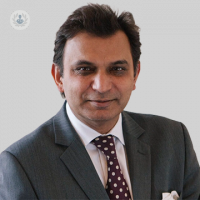Robotic surgery in prostatectomy: Advancing precision and recovery
Written in association with:In the realm of medical innovation, robotic surgery stands out as a revolutionary approach, particularly in the treatment of prostate cancer through prostatectomy. At the forefront of this advancement is the da Vinci Surgical System, a sophisticated technology that has redefined surgical precision and patient outcomes. In his latest online article, renowned consultant urologist and robotic surgeon Professor Prokar Dasgupta OBE offers his expert insight into this procedure.

What is robotic surgery in prostatectomy used to treat?
Robotic surgery, specifically in prostatectomy, is primarily utilised to treat prostate cancer. Prostatectomy involves the surgical removal of the prostate gland, often necessary when cancer has been detected in this vital organ. By employing robotic assistance, surgeons can perform this intricate procedure with unparalleled accuracy and control.
When is it recommended?
Robotic surgery is recommended for individuals diagnosed with prostate cancer who require surgical intervention to remove the affected gland. This approach may be advised based on various factors, including the stage of cancer, overall health status, and the patient's suitability for surgery.
The recovery period and advantages over non-robotic surgery
The recovery period following robotic prostatectomy is typically shorter compared to traditional open surgery. Patients often experience reduced hospital stays, minimised blood loss, and less post-operative pain. The key advantage lies in the minimally invasive nature of robotic surgery, where surgeons operate through tiny keyhole incisions rather than large cuts, leading to faster recovery and reduced risk of complications.
Furthermore, robotic surgery offers enhanced precision and visualisation. Surgeons manoeuvre the da Vinci Surgical System from a computer console, controlling robotic arms that mimic their hand movements with utmost precision. This heightened level of control enables surgeons to navigate delicate structures with greater accuracy, particularly beneficial in areas abundant with nerves and blood vessels.
One notable aspect of robotic surgery is the utilisation of 3D-printed models of the patient's prostate. These bespoke models enable surgeons to familiarise themselves with the unique anatomy of the prostate before the actual procedure, enhancing their understanding and tactile perception. This innovative approach mitigates the loss of tactile sensation associated with robotic surgery, ensuring thorough removal of cancerous tissue while minimising the risk of leaving behind cancer cells.
Specialised applications and ongoing advancements
Beyond prostatectomy, robotic surgery finds application in various other surgical disciplines, including gynaecology, colorectal surgery, hepatobiliary procedures, and urological interventions. The versatility of the da Vinci Surgical System, coupled with the expertise of specialised robotic surgeons, expands the horizons of minimally invasive surgery, offering patients advanced treatment options with superior outcomes.
In conclusion, robotic surgery represents a paradigm shift in the realm of prostate cancer treatment, offering patients precision, minimal invasiveness, and expedited recovery. With ongoing advancements and specialised applications, this innovative approach continues to redefine the landscape of surgical care, providing hope and improved outcomes for patients worldwide.
Professor Prokar Dasgupta is a renowned consultant urologist and robotic surgeon based in London. If you would like to book a consultation with Professor Dasgupta, you can do so today via his Top Doctors profile.


